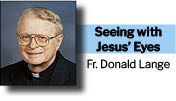
Each year in our diocese, we celebrate four of the most important feasts of the Church on four consecutive Sundays. These feasts are the Ascension, Pentecost, the Feast of the Holy Trinity, and the Solemnity of the Most Holy Body and Blood of Christ.
Like cars on a freeway during rush hour, they come quickly, one after another. This rapidity of feasts during a busy time of graduations, weddings, vacations, and other activities may hinder us from fully enjoying their graces.
The Ascension
In 2023, we celebrate the Ascension of Jesus into Heaven on May 21. The Ascension is not so much about Jesus’ absence, but his being present in a new way. Jesus has not abandoned us or left us orphans, but he intercedes for us from Heaven. From Heaven, Jesus sent the Holy Spirit at Pentecost to help us be his witnesses wherever we are.
Pentecost
In 2023, we celebrate Pentecost on May 28. Pentecost has been called the birthday of the Catholic Church when the early Church came of age. The apostles received the Holy Spirit on Easter evening. The wider Church received the Holy Spirit on Pentecost when Mary was also present.
On Pentecost, Peter and the apostles who deserted Jesus on Good Friday were transformed into courageous witnesses of Christ. The Church spread rapidly from Jerusalem to Samaria to Earth’s ends. During Confirmation we receive the Holy Spirit whom the Church received at Pentecost to strengthen us to be his witnesses like the apostles.
Trinity Sunday
On June 4, we celebrate the Feast of the Holy Trinity, the feast of God. The faith of us Christians rests on the Trinity. We were Baptized in the name of the Father, Son, and Holy Spirit. We begin and end Mass with the Sign of the Cross in the name of the Father, Son, and Holy Spirit. During Mass, the priest leads us in prayer to the Father through Jesus in the Holy Spirit.
In No. 234 of the Catechism of the Catholic Church it says, “The mystery of the Most Holy Trinity is the central mystery of Christian faith and life. It is the mystery of God in Himself. The whole history of salvation is identical with the history of the way and means by which the one true Father, Son, and Holy Spirit reveals himself to men, and reconciles and unites with himself those who turn away from sin.”
In No. 2205 of the Catechism of the Catholic Church, it says that the family is a communion of persons, a sign and image of the communion of the Father and the Son in the Holy Spirit. In the procreation and education of children, it reflects the Father’s work of creation. The family is called to partake of Christ’s prayer and sacrifice. Daily prayer and the reading of God’s word strengthen them in charity. The Christian family has an evangelizing task.
Corpus Christi
Finally, in 2023 on June 11, we celebrate the Solemnity of the Most Holy Body and Blood of Christ. In the 13th century, St. Juliana of Mont Cornillon, a Belgian nun, experienced a vision of the moon with a dark spot. Jesus revealed to her that the dark spot indicated that the Church needed a separate feast of the Eucharist. The Church already celebrated the institution of the Eucharist on Holy Thursday, but Holy Thursday points to Jesus’ passion and death and begins the Easter Triduum. Through Sister Juliana’s efforts, in 1264 Pope Urban IV commanded that the feast of Corpus Christi be observed by the Universal Church.
Corpus Christi focuses on adoration and belief in the Real Presence. In No. 1418 of the Catechism of the Catholic Church it says, “Because Christ is present in the sacrament of the altar, he is to be honored with the worship of adoration. To visit the Blessed Sacrament is a proof of gratitude, an expression of love, and a duty of adoration towards Christ our Lord.”
To receive Communion worthily, we must recognize that we are receiving Christ. Eucharistic Adoration and the Mass offer opportunities to recognize and adore Jesus in the Eucharist. When we receive Communion, the priest, deacon, or extraordinary minister holds up the host and says, “The Body of Christ.” We respond by saying “Amen” which means I believe that I am receiving Christ. We receive Christ to strengthen us to become a more Christ-like person.
To summarize, within a few weeks, we celebrate the feast of the Ascension of Christ into Heaven where he intercedes for us and sent the Holy Spirit to strengthen us to be his witnesses which we celebrate at Pentecost. The next Sunday we celebrate the feast of the Most Holy Trinity, the feast of God. The following Sunday we celebrate the Solemnity of the Most Holy Body and Blood of Christ.
These feasts can help prepare us for summer and for eternity.
Fr. Donald Lange is a pastor emeritus for the Diocese of Madison.

